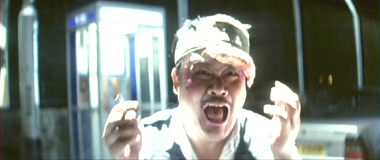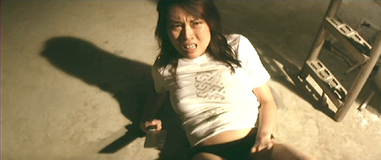|
Newest Reviews:
New Movies -
The Tunnel
V/H/S
The Tall Man
Mama Africa
Detention
Brake
Ted
Tomboy
Brownian Movement
Last Ride
[Rec]≥: Genesis
Hara-Kiri: Death of a Samurai
Indie Game: The Movie
Abraham Lincoln: Vampire Hunter
Old Movies -
Touki Bouki: The Journey of the Hyena
Drums Along the Mohawk
The Chase
The Heiress
Show
People
The Strange Affair of Uncle Harry
Pitfall
Driftwood
Miracle Mile
The Great Flamarion
Dark Habits
Archives -
Recap: 2000,
2001, 2002,
2003, 2004
, 2005, 2006,
2007 , 2008
, 2009 ,
2010 , 2011 ,
2012
All reviews alphabetically
All reviews by star rating
All reviews by release year
Masterpieces
Screening Log
Links
FAQ
E-mail me
HOME
| |
PTU (Johnnie To, 2003)
 Hong Kong action auteur Johnnie To
returns to the fray with PTU, a well-written police drama that takes
place over the course of a few hours. Unlike most films that attempt to
approximately approximate real-time, this is not a fast-paced thrill ride.
Itís a sharp, observational (not to be confused with insightful), minimalist
action movie, in which the spaces between the clashes are given more attention
than the clashes themselves. The plot is familiar stuff. Thereís a sting
operation gone wrong, gang warfare, a stolen gun, interdepartmental police
conflict, and a revenge killing. The way To uses those commonplace genre tropes
demonstrates his unconventional cinematic approach, though. Thanks to his
directorial prowess, he manages to make a film that feels fresh, despite the
fact that many of the elements itís built upon are stale. Every set piece
unmistakably bears its makerís mark. A chase scene is punctuated by the
moments where the pursuer and pursuant pause, with each other still in sight, to
catch their breath. A fight scene between a cop and a criminal is a one-sided
demonstration of police brutality until the victim suddenly stops breathing.
Itís only then that it becomes exciting. Another group of policemen round a
corner to find a car alarm blaring and a window smashed, with the cause of the
mayhem nowhere to be found. Action in a modern Johnnie To movie always seems to
be just out of reach. Hong Kong action auteur Johnnie To
returns to the fray with PTU, a well-written police drama that takes
place over the course of a few hours. Unlike most films that attempt to
approximately approximate real-time, this is not a fast-paced thrill ride.
Itís a sharp, observational (not to be confused with insightful), minimalist
action movie, in which the spaces between the clashes are given more attention
than the clashes themselves. The plot is familiar stuff. Thereís a sting
operation gone wrong, gang warfare, a stolen gun, interdepartmental police
conflict, and a revenge killing. The way To uses those commonplace genre tropes
demonstrates his unconventional cinematic approach, though. Thanks to his
directorial prowess, he manages to make a film that feels fresh, despite the
fact that many of the elements itís built upon are stale. Every set piece
unmistakably bears its makerís mark. A chase scene is punctuated by the
moments where the pursuer and pursuant pause, with each other still in sight, to
catch their breath. A fight scene between a cop and a criminal is a one-sided
demonstration of police brutality until the victim suddenly stops breathing.
Itís only then that it becomes exciting. Another group of policemen round a
corner to find a car alarm blaring and a window smashed, with the cause of the
mayhem nowhere to be found. Action in a modern Johnnie To movie always seems to
be just out of reach.
 PTUís shifted emphases make for
a unique style, no doubt, but itís one that is not without a slight drawback.
For all of the protracting of time and teasing of the audienceís anticipation,
one canít really argue that Toís direction results in a movie that is
significantly more exciting or suspenseful than your average police flick.
Aesthetically, the film is captivating, but there are a few scattered moments
where the dead space that To is highlighting still feels like nothing more than
dead space. The director combines empty streets, awkward body language, wide
open spaces and lighting that casts the actors in sharp relief to create a
slightly unnatural feel here, and in doing so asks action movie buffs to realign
their movie watching priorities. Those who expect the film to outdo John Woo
will be surprised to find that To is playing by his own rules. When itís at
its peak, however, Toís approach unlocks wit and grace in a genre not commonly
known for either. Inevitably, PTU ends with an elaborate shootout, but
even when the director finds thereís no way around showing a character running
and gunning, he opts to utilize slow-motion to drop the speed of the scene to a
near-standstill. PTUís shifted emphases make for
a unique style, no doubt, but itís one that is not without a slight drawback.
For all of the protracting of time and teasing of the audienceís anticipation,
one canít really argue that Toís direction results in a movie that is
significantly more exciting or suspenseful than your average police flick.
Aesthetically, the film is captivating, but there are a few scattered moments
where the dead space that To is highlighting still feels like nothing more than
dead space. The director combines empty streets, awkward body language, wide
open spaces and lighting that casts the actors in sharp relief to create a
slightly unnatural feel here, and in doing so asks action movie buffs to realign
their movie watching priorities. Those who expect the film to outdo John Woo
will be surprised to find that To is playing by his own rules. When itís at
its peak, however, Toís approach unlocks wit and grace in a genre not commonly
known for either. Inevitably, PTU ends with an elaborate shootout, but
even when the director finds thereís no way around showing a character running
and gunning, he opts to utilize slow-motion to drop the speed of the scene to a
near-standstill.
62
Jeremy Heilman
05-27-04
|